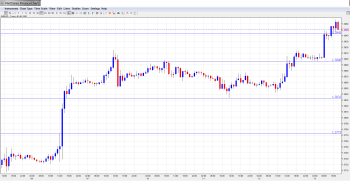The euro rally continues, as EUR/USD has risen to the mid-1.39 range in Thursday’s European session. The soaring euro is trading at its highest levels in 2-1/2 years. In economic news, French CPI surprised the markets, posting its sharpest gain in almost a year. It’s a busy day in the US, highlighted by Core Retail Sales and Unemployment Claims.
Here is a quick update on the technical situation, indicators, and market sentiment that moves euro/dollar.
EUR/USD Technical
- EUR/USD posted strong gains late in the Asian session, closing at 1.3952. The pair is unchanged in the European session.
Current range: 1.3830 to 1.3895.
Further levels in both directions:
- Below: 1.3940, 1.3895, 1.3830, 1.3773, 1.37, 1.3650, 1.3560, 1.3515 and 1.3450.
- Above: 1.40, 1.4149 and 1.4307.
- 1.40, a key level is the next resistance line. 1.4149 is stronger.
- 1.3940 is providing support, but is a weak line. 1.3895 follows.
EUR/USD Fundamentals
- 7:45 French CPI. Exp. 0.4%. actual 0.6%.
- 9:00 ECB Monthly Bulletin.
- 12:30 US Core Retail Sales. Exp. 0.2%.
- 12:30 US Retail Sales. Exp. 0.3%.
- 12:30 US Unemployment Claims. Exp. 334K.
- 12:30 US Import Prices. Exp. 0.6%.
- 14:00 US Business Inventories. Exp. 0.4%.
- 14:00 US Federal Reserve Governor Nomination Hearings.
- 14:30 US Natural Gas Storage. Exp. -199B.
- 17:01 US 30-year Bond Auction.
- 18:00 US Federal Budget Balance. Exp. -223.2B.
*All times are GMT
For more events and lines, see the Euro to dollar forecast.
EUR/USD Sentiment
- Euro climbs towards 1.40: The euro has been on the move since last week’s ECB meeting. ECB head Mario Draghi did not announce any moves but did say that low inflation was not a problem and the Eurozone was making a modest recovery. Are the markets buying it? Judging by the euro’s strong performance, the answer is yes. However, with the US releasing key consumer spending and employment numbers later on Thursday, the dollar could make a comeback if these releases are strong.
- US employment numbers fall short: Tuesday’s employment numbers were not a disaster, but could have been better, and didn’t help the struggling US dollar. JOLTS Job Openings dipped to 3.97 million in February, missing the estimate of 4.02 million and slipping to a three-month low. We’ll get a look at Unemployment Claims later on Thursday, with the markets expecting the key indicator to climb after last week’s strong release. The dollar has taken a hit in the past few days, and a better than expected employment release could put the brakes on the euro’s rally.
- QE taper likely: With the US posting solid Unemployment Claims and Nonfarm Payrolls late last week, the markets can breathe more comfortably as the Fed is likely to take its scissors and trim QE next week for the third time. New York Fed President William Dudley stated last week that the threshold to alter the Fed’s program to wind up QE was “pretty high”. In other words, short of a serious economic downturn in the US economy, we can expect the QE tapers to continue.
- Euro surges after ECB decision: The euro rose sharply after the ECB rate decision late last week, but this time it was due to a lack of action by the central bank, rather than a change in monetary policy or any dramatic comments by Draghi. There had been speculation that the ECB might lower deposit rates into negative territory or even commence a mini-QE scheme. In the end, the Bank held the course, with Draghi reiterating his well-worn script that the ECB’s high degree of accommodative monetary policy would continue for as long as needed. He also noted that the Eurozone economy was recovering at a moderate pace, and shrugged concerns about inflation levels well below the ECB’s target of 2%. Draghi may be able to point to encouraging data out of Germany to bolster his case that the region is headed in the right direction, but Eurozone data as well as numbers from major economies, such as France and Italy, raise questions about the health of the Eurozone.

